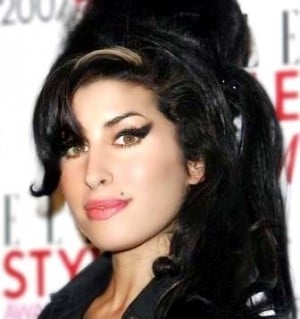Fame costs

Like everyone else, I was shocked and saddened to read about Amy Winehouse yesterday. With hindsight, looking back at that footage from the Belgrade concert a few weeks ago, it was pretty clear that something was definitely not right - even more so than over the past few years.
To be honest, when I was watching her stumbling around the stage in Serbia, I was prompted to write something about her decline from that sparky talented girl to the mixed-up source of tabloid headlines she had become - but her untimely death has really crystallised my thoughts about such a tragic waste of life.
Amy began her professional life at 16 following her training at the Sylvia Young Theatre School and The BRIT School in Croydon. There aren't many careers that you begin at 16 - never mind a career so fraught with mind-blowing highs, numbing disappointments and charismatic older "role models" urging experimentation. More importantly, starting work at 16 means you miss out on all that essential growing-up time when, although you are independent and have many of the legal rights of adulthood, you still need to do your A levels and get a degree. I wonder how differently things might have turned if Amy had started working a little later in her life. Might she have been better equipped for a life in the spotlight?
Attending a theatre school is the way many performers have historically entered the world of performing arts. But I've always thought that it was wrong to cut off your options at the age of 10 and be trained predominantly in theatre or music when you might want to change career at 18. It's rather like joining a nunnery - how can you possibly make that decision so young? As a former actress myself, I remember an actor friend telling me that he couldn't do anything else as he'd been at a stage school since he was a young boy. He felt that the desperate quest for stardom he and his parents had strived for (and which of course is continually encouraged by all the staff) had ruined his chances to succeed at anything else.
As Principal of a children's drama school, you might justifiably argue that I'm hardly in a position to point the finger. But one of the main reasons that I set up Perform eleven years ago and why I think it's successful today is precisely because it doesn't focus on ?putting your daughter (or son) on the stage?.
In fact, despite teaching children drama, dance and singing, our aims are almost the complete opposite. We don't recommend that children go to auditions, we don't put them up for films, we don't let casting directors come and watch them (despite myriad requests) - just as we certainly don't expect them to decide on their future career or be encouraged to work when they are so young. We introduce them to the performing arts purely to help them with skills that will be useful to them whatever they do in the future - clear speaking, eye contact, vocabulary, focusing, hand-to-eye coordination. They're all vital attributes to have whether a child ends up as an accountant or Lawrence Olivier.
Before I started Perform, I was in Cameron Mackintosh's production of Oliver! at The London Palladium. Because of my love of children, I was promoted to Head Girl. Being Head Girl meant that I auditioned and rehearsed the children in the show (of which there were many). I knew that the world of showbiz was cut-throat, of course, but it did worry me when 7 year olds would say that they were ?holding out for telly rather than theatre as it paid better?. And of course parents colluded in this, their eyes bright with reflected glory and a handy bit of extra cash - never stopping to think about the price of a lost childhood spent being judged "not cute enough" by hard-faced casting directors.
So, it was at least partly in response to this that I wanted Perform to be an environment where children could come, enjoy the performing arts and not feel a pressure for it to be anything more than fun.
But what would you do if you had a child with exceptional talent? Would you send them to stage school? Obviously, they'd get the training and the opportunity to showcase their talents but what about the limiting of their options? Most stage schools do not offer the education that normal schools do (whatever they claim) so is it really fair to channel a child's whole future into the choices you make for them at 11? There are examples of success and failure on both sides, of course, but my feeling is that for every Shirley Temple, Jodie Foster and Emma Watson, there are at least two of Michael Jackson, Judy Garland, Lindsay Lohan, Britney Spears and now...Amy Winehouse.
So what do you think? Should stage schools be discouraged or even banned? Should children be allowed to ?work' so young? Or would Amy Winehouse be in exactly the same position had she become a lawyer? Let me know your thoughts via the comments.










 Recent Posts
Recent Posts Recent Comments
Recent Comments
 Archives
Archives

Leave a comment
Amy Winehouse certainly is a tragic case - although looking at the listed alumni of Sylvia Young, she does stand out somewhat as not seeming to quite fit in. Genuine raw talent rather than learned. I don't really have a strong opinion on whether stage schools should be allowed or not, but I do get the feeling that Amy was simply a tortured soul who would have followed a similar path with or without fame.